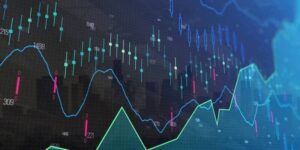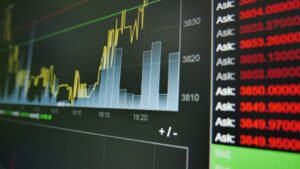
Stock indices of the Asia-Pacific region (APR) are rising during trading on Wednesday, following the dynamics of the US stock market.
China’s Shanghai Composite rose 1.06% by 8:24 pm, Hong Kong’s Hang Seng rose 1.45%.
Alibaba (SPB: BABA) Health Information Technology Ltd., which provides services for the collection and use of medical data (+7.6%), and biopharmaceuticals CSPC Pharmaceutical Group Ltd. are the leaders in growth of quotations on the Hong Kong Stock Exchange. (+6.3%) and Wuxi Biologics (Cayman) Inc. (+5.7%).
Paper retailer JD.com Inc. (SPB: JD) gained 0.3% while Alibaba Group lost 1.3%.
The value of the Japanese index Nikkei 225 to 8:27 qoq increased by 0.9%.
The shares of Denka Co, a chemical company, are rising most significantly. Ltd. (+6.1%), M3 Inc., providing medical services (+4.7%), and insurer T&D Holdings Inc. (+4.1%).
The South Korean index Kospi added 0.7% by 8:30 qoq.
Quotes of securities of one of the world’s largest manufacturers of chips and electronics Samsung Electronics Co. grow by 3%, the cost of automaker Kia Corp. decreases by 0.8%.
Shares of another South Korean chipmaker, SK Hynix Inc., rose 1.4%, although the company said it plans to cut investments in 2023 by more than half amid a sharp decline in third-quarter net income due to weak demand for semiconductors.
The Australian S&P/ASX 200 gained 0.2%.
Consumer price growth in Australia accelerated, raising fears that the Reserve Bank of Australia will have to raise interest rates more than previously forecast, writes MarketWatch.
Consumer prices rose 7.3% in September compared to a revised 6.9% growth a month earlier. This is the highest inflation rate since at least September 2018, writes Trading Economics.
The capitalization of the world’s largest mining companies BHP and Rio Tinto increased by 0.1% and 0.6%, respectively.

Most Asian stock indices are falling on Friday following similar dynamics in the US stock market a day earlier.
Investors are concerned that the Federal Reserve will continue aggressive tightening of monetary policy for the foreseeable future due to persistently high inflation, which could negatively affect the US economy.
Traders are waiting for the Fed to raise its base interest rate to 5% per annum next year. Last week, prior to the publication of fresh data on inflation in the US, they assumed a rise to 4.6%, according to futures on the size of the rate.
Consumer prices in Japan rose 3% in September from the same month a year earlier, the country’s Ministry of Interior and Communications said on Friday. Similar rates of increase were recorded in August. They are the highest since September 2014, while the rise in prices was noted for the thirteenth month in a row.
Consumer prices excluding fresh food, a key indicator monitored by the Bank of Japan, rose 3% year-on-year last month after rising 2.8% in August. The indicator exceeded the central bank’s 2% target for the sixth month in a row. At the same time, growth rates were the highest since September 2014.
The value of the Japanese index Nikkei 225 to 8:17 KSK fell by 0.4%.
Including the shares of such large companies as Fast Retailing (-0.9%), Toyota Motor (-0.4%) and Sony Group (-0.8%) become cheaper.
China’s Shanghai Composite rose 0.3% by 8:22 am KST, while Hong Kong’s Hang Seng shed 0.5%.
Shares of Shenzhou International Group Holdings Ltd., which is engaged in the production and sale of knitwear, are the leaders of the decline in quotations on the Hong Kong Stock Exchange. They fell in price by 6.3%.
In addition, the value of Budweiser Brewing Co. APAC (-3.7%), Chow Tai Fook Jewelery Group (-3.4%), sporting goods manufacturer Li Ning Co. (-3.4%).
Casino operator Sands China reported an 11.6% increase in net loss in the third quarter due to anti-coronavirus restrictions in Macau. The company’s shares lose 3.2% in price.
Meanwhile, stock quotes of online retailers Alibaba Group and JD.com Inc. rise respectively by 0.4% and 1.4%, the Internet giant Tencent Holdings Ltd. – by 0.9%.
The South Korean Kospi index decreased by 0.35% by 8:17 am KSK.
Quotes of securities of one of the world’s largest manufacturers of chips and electronics Samsung Electronics Co. rise by 0.9%, while the cost of automaker Hyundai Motor fell by 1.2%.
Share price of Samsung SDI Co. soared 5.9% on the news that the company has completed the construction of an enterprise for the production of components for the production of car batteries. It is expected that production on it will begin in the first quarter of 2023.
The Australian S&P/ASX 200 fell 0.8%. According to the results of the whole last week, it lost more than 1%.
Capitalization of the world’s largest mining companies BHP and Rio Tinto decreased on Friday by 0.7% and 0.8% respectively.
In addition, the shares of all four largest banks in the country fell in price: Commonwealth Bank – by 1.5%, ANZ Bank – by 1.1%, Westpac Banking – by 0.8% and National Australia Bank – by 1.5%.

The main stock indexes of the Asia-Pacific region (APR) are steadily rising during trading on Tuesday following the US stock market.
American stock indices finished the first trading session of the fourth quarter with a steady growth, the rise of the Dow Jones Industrial Average was the highest since February, amounting to 2.7%.
Mainland China’s stock exchanges are closed for the Founding Day of the People’s Republic of China holidays, Hong Kong’s stock exchanges for the Double Ninth Festival.
The value of the Japanese index Nikkei 225 to 8:27 CSK increased by 2.8%.
Among the components of the index, the growth leaders are Nippon Sheet Glass Co. Ltd. (+8.4%), Itochu Corp. (+7.9%) and Marubeni Corp. (+6.8%).
In addition, the price of securities of investment and technology SoftBank Group (+5.1%), consumer electronics manufacturer Sony (+2.3%), automotive Nissan Motor (+2%) and Toyota Motor (+2.7%) is rising.
The South Korean Kospi index increased by 2.4% by 8:30 am KSK.
Purchasing Managers Index (PMI) in the processing industry of South Korea, calculated by S&P Global, fell to 47.3 points in September from 47.6 points a month earlier. A PMI value above 50 points indicates an increase in activity in the sector, below – its weakening. Thus, activity in the sector has been declining for the third month in a row.
Quotes of securities of one of the world’s largest manufacturers of chips and consumer electronics Samsung Electronics Co. grew by 4%, while automaker Hyundai Motor – by 1.4%.
The Australian S&P/ASX 200 added 3.75%.
Shares of the world’s largest mining companies BHP and Rio Tinto increased by 3.8% and 3.1%, respectively.
The Reserve Bank of Australia (RBA) unexpectedly slowed down the pace of key interest rate hikes, noting the deterioration of the global economic outlook.
The rate was raised on Tuesday by 25 basis points (bp) to 2.6%. The vast majority of economists expected it to increase by 50 bp, writes The Wall Street Journal.
The RBA raised the bet by 50 bp. in June, July, August and September, in an effort to slow inflation, which the Central Bank expects to peak by the end of 2022 at around 8%.

Stock indices of the largest countries in the Asia-Pacific region fall on Thursday following the US stock market.
Trading on stock exchanges in Australia on Thursday is not held in connection with the Day of Sorrow for Queen Elizabeth II.
Investors evaluate the results of the September meeting of the US Federal Reserve System (FRS). The American Central Bank raised the interest rate on federal funds (federal funds rate) by 75 basis points, now its range is 3-3.25% per annum. The decision coincided with the forecasts of most economists and analysts and was adopted unanimously by all 12 voting members of the FOMC.
Thus, the Fed raised the base rate by 75 bp. for the third meeting in a row. It is now at its highest level since the 2008 financial crisis. At the same time, based on Fed estimates, by the end of 2022 the rate will reach 4.4% per annum.
The Fed, along with many other central banks around the world, has been actively raising interest rates this year in order to slow down economic growth and curb inflation, beating multi-year records. Financial market participants, in turn, are worried that such actions could harm the growth of the global economy and provoke a recession.
Meanwhile, the Bank of Japan continues to stay away from the global wave of tightening monetary policy, despite increased inflation in the country. The regulator left unchanged the main parameters of monetary policy (MP) on the basis of the two-day meeting that ended on Thursday.
The short-term interest rate on deposits of commercial banks with the Central Bank was left at minus 0.1% per annum, the target yield on ten-year government bonds is near zero, the Japanese Central Bank said in a statement. The Bank of Japan also confirmed that it intends to keep the rate “at the current level or below.”
The value of the Japanese index Nikkei 225 by 8:15 Moscow time decreased by 0.6%.
The drop leader is shares of non-ferrous metal producer Toho Zinc Co. Ltd. (-2.95%), logistics Kawasaki Kisen Kaisha Ltd. (-2.7%) and recruiting Recruit Holdings Co. Ltd. (-2%).
Papers of the software developer Oracle Corp. (SPB: ORCL) Japan fell 5% after the release of its first financial quarter. The company’s net profit decreased by 3.8% on the back of rising costs.
The Chinese Shanghai Composite index fell by 0.2% by 8:20 Moscow time, the Hong Kong Hang Seng lost 1.8%.
Leading decliners on the Hong Kong Stock Exchange include shares of PC maker Lenovo Group Ltd. (-4.8%), IT company Alibaba Group Holding (SPB: BABA) Ltd. (-3.2%), operator of the Hong Kong exchange Hong Kong Exchanges & Clearing Ltd. (-3%) and JD.com Inc. (SPB: JD) (-2.9%).
The South Korean index Kospi by 8:25 Moscow time fell by 1%.
Shares of one of the world’s largest manufacturers of chips and consumer electronics Samsung Electronics Co. fell by 1.6%, automaker Hyundai Motor – by 1.8%.